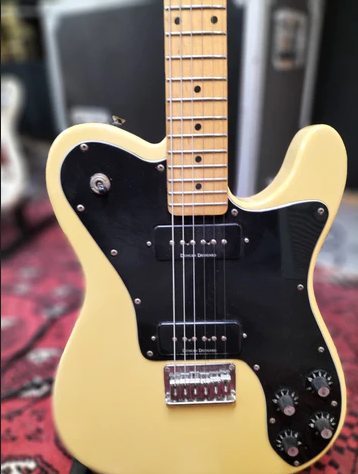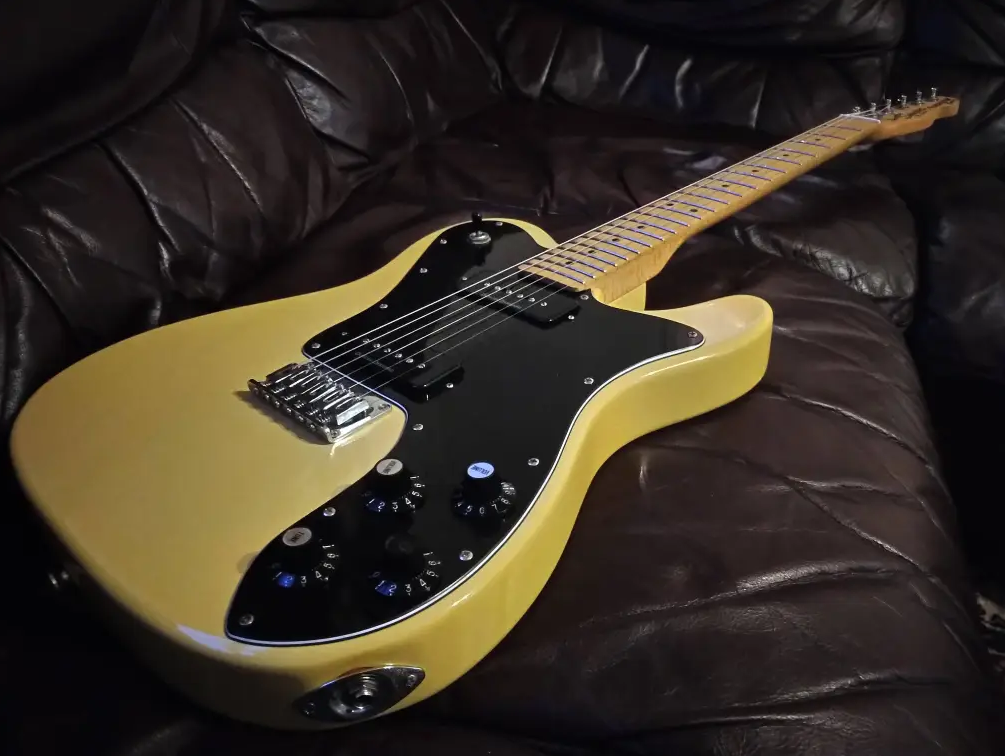Review of the Squier Telecaster Custom
The Squier Telecaster Custom boasts an extraordinary one-piece maple neck that surpasses expectations, even at its affordable price. With a standard 25.5″ scale length and modern C profile, it delivers a seamless playing experience. The addition of the 22nd fret adds versatility, while the well-sized frets enable effortless slides and bends. The straight string pull and expertly crafted nut ensure a hassle-free playing experience across all musical styles.
Adding a touch of nostalgia, the vintage-inspired 7.25″ radius maple fingerboard perfectly conforms to your hand, offering optimal comfort, confidence, and speed. This neck seamlessly blends modern and vintage elements, creating an effortless playing experience. It feels solid and reliable, yet it effortlessly melds with your hand, allowing you to take creative risks and elevate your playing to new heights.
The Remarkable P90 Bridge Pickup
The remarkable Duncan Designed P90-2 Alnico 5 pickups in the bridge position of the Squier Telecaster Custom surpass expectations. As a Gibson 498T user, I relied on its power, clarity, and sustain during live performances.
The P90 pickup in the Telecaster Custom matches and surpasses that performance. With its P90 configuration, maple neck, and body, it delivers impressive punch, clarity, and thickness. It offers more definition than a Les Paul and a fuller sound compared to a standard Telecaster. While a traditional Tele setup may be preferable for cleaner country or blues tones, the Squier Telecaster Custom with its P90 bridge pickup strikes a perfect balance for my indie, rock, and pop music needs.
Unmatched Durability Inspired by the Legendary Fender Telecaster
The Fender Telecaster has earned a reputation as one of the most durable electric guitars ever created, and the Squier Telecaster Custom proudly inherits many of its original design features. The familiar bolt-on neck with no neck angle, along with the robust tuners and reliable string trees, ensure a solid and steadfast instrument.
However, the Squier Telecaster Custom introduces a few notable differences. Positioned on the upper bout, the 3-way toggle switch and individual tone and volume controls for each pickup emulate the layout found on Gibson guitars. As someone who has owned Telecasters in the past, I find this configuration to be a significant improvement. It eliminates the risk of accidentally hitting the traditional Telecaster pickup selector, which can occur if one is not cautious or hasn’t made necessary adjustments. With this guitar, there are no such concerns.
Effortless Simplicity for Worry-Free Performances
Featuring two pickups, each with its own volume and tone controls, and a convenient 3-way toggle switch, the Squier Telecaster Custom embraces simplicity without compromising versatility. The absence of a tremolo arm, combined with the guitar’s inherent durability, instills in me the confidence to forgo a guitar case and confidently carry it in a gig bag. This minimalist setup allows me to seamlessly switch between distinctive rhythm and lead tones during performances, without the need for additional pedals or complicated setups.
The Squier Telecaster Custom’s unique blend of Features
The Squier Telecaster Custom blends modern and vintage features into a package perfectly suited to my playing style and tone needs:
- The neck melts into your hand;
- I can set up perfect intonation and action with the 6 saddles individually adjustable saddles, as opposed to the compromise of 3;
- It won’t slice my hand open on the traditional Tele slider switch;
- I can switch between different volume/tone setups for the pickups;
- I can carry it in a gig bag without fear of the neck snapping or damage to the trem system;
- It sounds fatter than a normal Tele, but cuts through better than a Les Paul, thanks to the high output P90’s.
Incredible Bang for Your Buck
When considering the overall package, the Squier Telecaster Custom stands as a testament to remarkable value, reminiscent of the impressive BOSS Katana 50 amplifier (full review here). This guitar delivers a fantastic sound and reliability, making it a worthy companion for gigging, all at a price point under £200. While some may have an insatiable desire for the renowned ‘F’ logo on the headstock, obtaining that privilege typically comes at a significantly higher cost. (Although it’s worth noting that the Squier Telecaster Custom discreetly features a smaller ‘F’ beneath the Squier logo).

Drawbacks of the Squier Telecaster Custom
Concerns about the Telecaster’s Jack Socket
The Fender (or Squier) Telecaster is often plagued by concerns surrounding its outdated jack socket design. The socket relies on a bent steel “retainer clip” with teeth that grasp the socket hole, held in place solely by the tension from the jack socket nut. With regular use, the socket tends to loosen, resulting in potential issues such as the input jack becoming dislodged or the retainer clip failing. Thankfully, there are simple solutions like using an “electro-socket” with internal screw holes or a standard Gibson-style socket plate with front-facing screws for a more permanent fix. It remains puzzling why Fender persists with this original and flawed design for the jack socket.
Underwhelming Neck Pickup
I love neck pickups, like the 490R on my Gibson Les Paul. It produces that velvety “Woman Tone” and the iconic intro to “Sweet Child ‘o Mine.” Neck P90s on a mahogany body are also a favorite, offering warm, melodic tones that complement brighter trebles.
However, the P90 on this Squier Telecaster Custom with an agathis body disappoints. It sounds cleaner and has a lower output compared to the bridge pickup. Regardless of the applied gain, it produces an unpleasant tinny sound. The neck pickup should deliver a bigger, warmer tone with some sacrifice in high-end frequencies. The lack of depth and punch, regardless of the setup, could be due to the body material. Some claim agathis is a budget substitute for mahogany. Replacing the pickup with a higher-quality option easily solves this flaw. Initially, I waited to assess the guitar’s feel before making the switch, considering the cost. Now that I’m sticking with the guitar, the upgrade will be worthwhile, given gig earnings. The neck pickup is less offensive with clean tones, providing the depth that’s missing with overdrive and a useful brightness.
Unfortunate Color Combination
I had my heart set on the all-black model. There’s something captivating about black Telecasters with maple fingerboards—they exude sheer beauty. However, the advertised butterscotch finish clashes a bit with the black pickguard. The finish lacks the ability to age gracefully like nitrocellulose, so I find myself stuck with an unappealing color scheme. It’s akin to an ugly duckling that I have to embrace.
The Guitar’s Personal Journey
After writing about Guitar Acquisition Syndrome, I am thrilled to say that I now own the remarkable Squier Telecaster Custom! It mysteriously disappeared from the shop display the day after I saw it, only to be revealed as a heartwarming birthday surprise from my wife. Since then, this guitar has become an integral part of my musical journey, accompanying me to gigs and creating beautiful music. Its sentimental value grows with each passing day.
Key Features of Squier Telecaster Custom
| Specification | Details |
|---|---|
| Body | Agathis |
| Neck | Maple, C-Shape, (Gloss Polyurethane Finish) |
| Fingerboard | Maple, 7.25″ Radius (184 mm) |
| No. of Frets | 22 Medium Jumbo Frets |
| Pickups | 2 Duncan Designed™ P90-2 Pickups with Alnico 5 Magnets (Neck/Bridge) |
| Controls | Volume 1. (Neck Pickup), Tone 1. (Neck Pickup), Volume 2. (Bridge Pickup), Tone 2. (Bridge Pickup) |
| Pickup Switching | 3-Position Toggle: Position 1. Bridge Pickup, Position 2. Bridge and Neck Pickups, Position 3. Neck Pickup |
| Bridge | 6-Saddle Strings-Thru-Body Tele Bridge |
| Machine Heads | Standard Die-Cast Tuners |
| Hardware | Chrome |
| Pickguard | 3-Ply Black |
| Scale Length | 25.5″ (648 mm) |
| Width at Nut | 1.650″ (42 mm) |
How to Obtain a Squier Telecaster Custom (with P90s)
Regrettably, the Squier Telecaster Custom with P90 pickups is no longer being manufactured. If you prefer not to invest a substantial sum in a more premium Fender model, your choices are somewhat restricted. You can explore the used market for potential options or explore alternatives like the Squier Classic Vibe or Vintage Modified series, which provide comparable features and craftsmanship. Additionally, it’s worth mentioning that a humbucker-equipped version of the Squier Telecaster Custom was also available.
Conclusion
If it wasn’t already evident, I’m deeply enamored with this Squier Telecaster Custom. Its sound, playability, durability, and the perfect balance of simplicity and features have won me over. Yes, it has its flaws, but they pale in comparison to the incredible value this guitar offers. It has its own unique story and character, and with each passing week, it continues to add new chapters.
If you ever come across a Squier Telecaster Custom with P90s, I highly recommend getting one. I’m confident that you’ll have a faithful companion for life, just like I have.

Events
Contact
- +1 952-290-1163
- 1443 Oral Lake Road
New Prague, MN 56071
About Musical Events Tours

Musical Events Tours is group and individual travel to music events outside of the country.
The main value of our services is a full package of necessary attributes for carefree attendance of your favorite musical event. Starting from exclusive and sometimes unaffordable tickets, comfortable transportation, flights, as well as transfers and optimal accommodation.